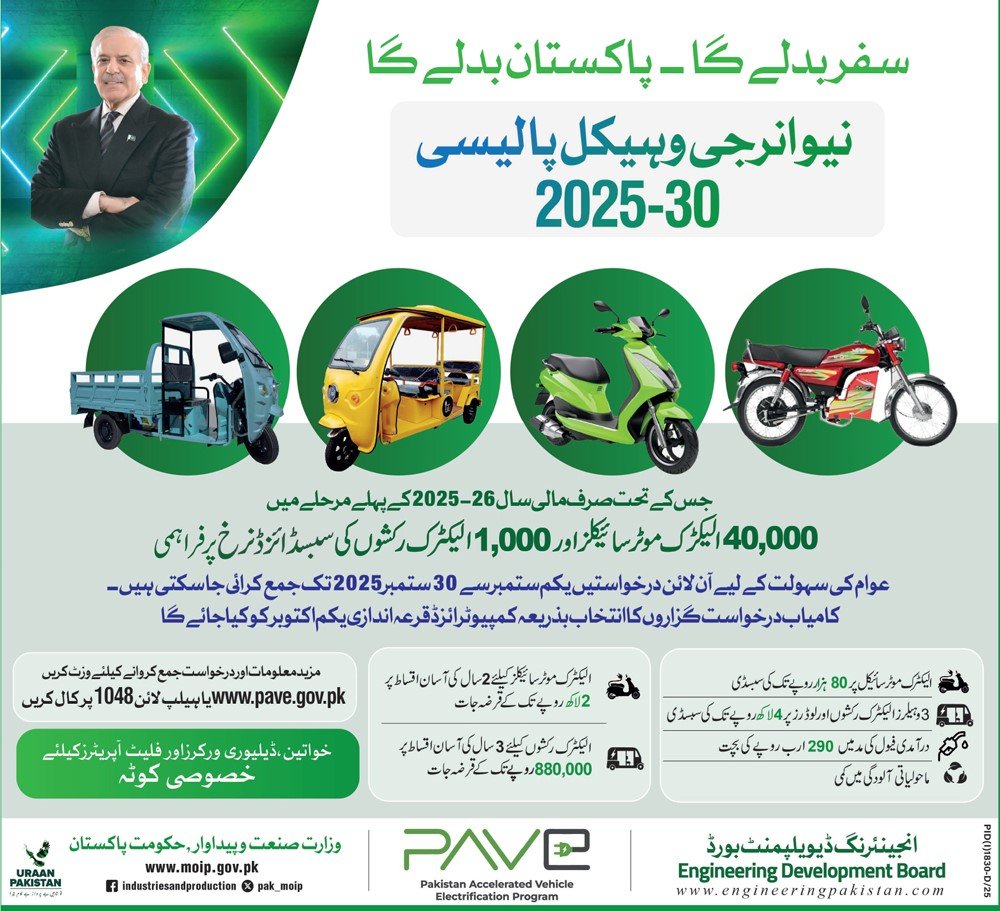Pakistan Electric Vehicle Policy 2025–2030: Affordable EVs, Charging Stations & Subsidies
Pakistan’s EV Policy 2025–2030 introduces 40,000 electric vehicles, 1,000 charging stations, and subsidies for affordable green mobility.
Pakistan has officially launched its Electric Vehicle (EV) Policy for 2025–2030, marking a major shift toward sustainable transportation. With plans to introduce 40,000 electric vehicles and establish 1,000 charging stations nationwide, the policy aims to reduce emissions, lower fuel dependency, and make eco-friendly mobility accessible to all. Whether you’re a student, wage worker, or business owner, this initiative opens the door to affordable and cleaner transport options.
What Is Pakistan’s Electric Vehicle Policy 2025–2030?
The Pakistan Electric Vehicle Policy 2025–2030 is a government-led initiative designed to promote the widespread adoption of electric vehicles. Spearheaded by the Ministry of Industries and Production, the Engineering Development Board, and the Pakistan Electric Vehicles (PAVE) initiative, the policy focuses on:
- Reducing carbon emissions
- Lowering fuel imports
- Creating green jobs
- Making EVs affordable for the public
This policy aligns with Pakistan’s broader goals of environmental sustainability and economic resilience.
Key Highlights of the EV Policy
40,000 Electric Vehicles in 2025–26
In the fiscal year 2025–26, the government will introduce 40,000 electric vehicles across Pakistan. These include:
- Three-wheeled cargo vehicles
- Passenger rickshaws
- Electric scooters
- Electric motorcycles
This rollout will prioritize urban and semi-urban areas, offering affordable transport solutions to wage workers, students, and small business owners.
1,000 Charging Stations Nationwide
To support the growing EV fleet, 1,000 charging stations will be established across the country. These stations will be located in:
- Major cities
- Highways
- Commercial zones
- Public transport hubs
This infrastructure will ensure convenience and reduce range anxiety for EV users.
Subsidies & Tax Incentives for EV Buyers
The EV Policy offers generous financial incentives to make electric vehicles more accessible:
- Subsidized Prices: EVs will be available at reduced rates starting in 2025
- Registration & Token Tax Exemption: Buyers will benefit from lower registration fees and token taxes
- Special Number Plates: EVs will receive exclusive green number plates for identification and benefits
These incentives aim to encourage adoption among low-income groups and first-time vehicle owners.
Environmental & Economic Impact
Cleaner Air & Reduced Emissions
Electric vehicles produce zero tailpipe emissions, helping reduce air pollution in cities like Karachi, Lahore, and Islamabad. This shift will improve public health and contribute to climate resilience.
Job Creation & Local Manufacturing
The policy promotes local manufacturing and assembly of EVs, which will:
- Create thousands of green jobs
- Boost the automotive industry
- Reduce reliance on imported fuel and components
This supports Pakistan’s vision for sustainable development and economic independence.
How to Learn More & Get Involved
Citizens can explore the EV policy and upcoming opportunities by visiting:
- www.moip.gov.pk
- www.pave.gov.pk
- Email: info@pave.gov.pk
- Phone: 051-1048 1048
You can also scan the QR code on the official poster to access detailed guidelines, eligibility criteria, and dealership information.
Inclusive Access for All Communities
The EV Policy is designed to be inclusive, ensuring access for:
- Women and girls facing mobility barriers
- Non-Muslim communities
- Wage workers and underserved populations
This reflects the government’s commitment to equitable development and environmental justice.
Conclusion & Call-to-Action
Pakistan’s Electric Vehicle Policy 2025–2030 is a transformative step toward a cleaner, smarter future. With affordable EVs, nationwide charging stations, and government subsidies, now is the time to embrace sustainable mobility.
👉 Apply for EV incentives, explore dealership options, and share this blog with others who can benefit. Let’s drive Pakistan toward a greener tomorrow—one electric vehicle at a time.

Leave a Reply